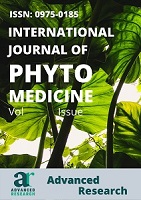Phytochemical Screening and Acute Toxicity Study of Cucumis metuliferus E. Mey. Ex. Naudin Fruit Extract in Cockerels
Keywords:
Phytochemical screening, Cucumis metuliferus, acute toxicity, LD50, cockerelsAbstract
The ripe fruits of Cucumis metuliferus were collected at Vom, Jos South Local Government Area of Plateau State, cleaned, sliced, air-dried, pulverised and cold extracted with solvents of different polarities (n-hexane, chloroform, methanol and distilled water). The ground powder and the extracts obtained were phytochemically screened for their chemical composition. These revealed the presence of saponins, alkaloids, carbohydrates, flavonoids, tannins, cardiac glycosides, steroids and terpenoids. The median lethal dose (LD50) of the methanol extract was determined in chicken by oral (p.o) and intra-peritoneal (i.p) routes. An LD50 above 5000 mg/kg body weight was established for both routes, indicating that probably the fruit of C. metuliferus is not toxic.
References
. Abdulrahaman FI, and Onyeyili PA.
(2001). Phytochemical screening and
pharmacological activities of the stem
-bark of Terminalia avicennoides. Bull.
Anim. Hlth. Prod. Afr. 49:236-243.
. Sodipo OA, Abdulrahaman FI, Akan
JC, and Akinniyi JA. (2008).
Phytochemical screening and
elemental constituents of the fruit of
Solanum macrocarpum Linn.
Continental J. Appl. Sci. 3:85-94.
. Madziga HA, Sanni S, and Sandabe
UK. (2010). Phytochemical and
elemental analysis of Acalypha
wilkesiana leaf. J. Amer. Sci.
(11):510-514.
. Dawurung CJ, Elisha IL, Offiah NV,
Gotep JG, Oladipo OO, Makoshi
MS, Makama S, and Shamaki D.
(2012). Antidiarrheal evaluation of
aqueous and ethanolic leaf
extracts of Acacia sieberiana DC.
(Fabaceae) in albino rats.Asian J.
Exp. Biol. Sci. 3(4): 799-803.
. Cho EJ, Yokozawa T, Rhyu DY, Kim
SC, Shibahara N and Park JC. (2003).
Study on the inhibitory effects of
Korean medicinal plants and their main
compounds on the 1,1-diphenyl-2-
picrlhydrazyl radical. Phytomed.
:544- 551.
. Wannang NN, Jimam NS, Omale S,
Dapar LMP, Gyang SS, and Aguiyi
JC. (2007). Effects of Cucumis
metuliferus (Cucurbitaceae) fruits on
enzymes and haematological
parameters in albino rats. Afr. J.
Biotech. 6(22):2515-2518.
. Bates DM, Robinson RW. and Jeffrey
C. (1990). Biology and Utilization of
Curcubitaceae. Cornell Pub. p.13.
. Wannang NN, Gyang,SS, Omale S,
Dapar LMP, Jiman NS, and Anakwe,
C. (2009). The effect of Cucumis
metuliferus E. Meye (Cucurbitaceae)
on rat gastric functions and mucosal
integrity. Nig. J. Nat. Prod. and
Med. 12:37-39.
. Omale S, Wuyep NN, Auta A and
Wannang NN (2011). Anti-ulcer
properties of alkaloids isolated from
the fruit pulp of Cucumis metuliferus
(Cucurbitaceae). Int. J. Pharmaceut.
Sci. Res. 2(10):2586-2588.
. Gotep J. (2011). Glycosides fraction
extracted from fruit pulp of Cucumis
metuliferus E. Meyer has
antihyperglycemic effect in rats with
alloxan-induced diabetes. J. Nat.
Pharm. 2:48-51.
. Wannang NN, Kwanashie HO, Ede
SO. (2010). Antiviral activity of the fruit
extract of Cucumis metuliferus E.
Meye (Curcubitaceae) in chicks.
Afr. J. Basic Appl. Sci. 2(2-4):89-93.
. Cheji R. (1984). Encyclopedia of
Medicinal plants. MacDonald and Co.
Ltd. London, vol. 356, pp 10541-
. Jimam NS, Wannang NN, Anuka JA,
Omale S, Falang KD, and Adolong
A.A. (2011). Histopathologic effects of
C. metuliferus E. Mey.
(Cucurbitaceae) fruits in albino rats.
Int. J. Pharmaceut.Sci. Res.
(8):2190- 2194.
. Wannang NN, Jiman NS, Gyang SS,
Bukar BB, and Gotom S. (2008).
Effects of Cucumis metuliferus E.
Mey. ex. Naud. (Cucurbitaceae) fruit
extract on some male reproductive
parameters in adult rats. Afr. J. Phar.
Pharmacol. 2(3):048- 051.
. Sofowora A. (2008). Medicinal Plants
and Traditional Medicine in Africa. 3rd
ed. Ibadan Spectrum Books Limited.
pp 9, 181-204.
. Evans WC. (2009). Trease and Evans
Pharmacognosy 16th ed. Saunders,
Elsevier Ltd. China. p.178.
. Lorke D. (1983). A new approach to
practical acute toxicity testing. Arch.
Toxicol. 54: 275-287.
. Watts JM. and Brewer-Brandwyk, M.G.
(1962). The Medicinal and Poisonous
Plants of South Africa, 2nd ed. E and S
Livingstone Ltd. Edingburgh, U.K. p.
. Robbinson J. (1967). Organic
Constituents of Higher Plants. Burgress
Pub. U.S.A. 1st ed. p. 20.
. Frantisek SS. (1991). The Natural
Guide to Medicinal Herbs and Plants
. Abdulrahaman FI, and Onyeyili PA.
(2001). Phytochemical screening and
pharmacological activities of the stem
-bark of Terminalia avicennoides. Bull.
Anim. Hlth. Prod. Afr. 49:236-243.
. Sodipo OA, Abdulrahaman FI, Akan
JC, and Akinniyi JA. (2008).
Phytochemical screening and
elemental constituents of the fruit of
Solanum macrocarpum Linn.
Continental J. Appl. Sci. 3:85-94.
. Madziga HA, Sanni S, and Sandabe
UK. (2010). Phytochemical and
elemental analysis of Acalypha
wilkesiana leaf. J. Amer. Sci.
(11):510-514.
. Dawurung CJ, Elisha IL, Offiah NV,
Gotep JG, Oladipo OO, Makoshi
MS, Makama S, and Shamaki D.
(2012). Antidiarrheal evaluation of
aqueous and ethanolic leaf
extracts of Acacia sieberiana DC.
(Fabaceae) in albino rats.Asian J.
Exp. Biol. Sci. 3(4): 799-803.
. Cho EJ, Yokozawa T, Rhyu DY, Kim
SC, Shibahara N and Park JC. (2003).
Study on the inhibitory effects of
Korean medicinal plants and their main
compounds on the 1,1-diphenyl-2-
picrlhydrazyl radical. Phytomed.
:544- 551.
. Wannang NN, Jimam NS, Omale S,
Dapar LMP, Gyang SS, and Aguiyi
JC. (2007). Effects of Cucumis
metuliferus (Cucurbitaceae) fruits on
enzymes and haematological
parameters in albino rats. Afr. J.
Biotech. 6(22):2515-2518.
. Bates DM, Robinson RW. and Jeffrey
C. (1990). Biology and Utilization of
Curcubitaceae. Cornell Pub. p.13.
. Wannang NN, Gyang,SS, Omale S,
Dapar LMP, Jiman NS, and Anakwe,
C. (2009). The effect of Cucumis
metuliferus E. Meye (Cucurbitaceae)
on rat gastric functions and mucosal
integrity. Nig. J. Nat. Prod. and
Med. 12:37-39.
. Omale S, Wuyep NN, Auta A and
Wannang NN (2011). Anti-ulcer
properties of alkaloids isolated from
the fruit pulp of Cucumis metuliferus
(Cucurbitaceae). Int. J. Pharmaceut.
Sci. Res. 2(10):2586-2588.
. Gotep J. (2011). Glycosides fraction
extracted from fruit pulp of Cucumis
metuliferus E. Meyer has
antihyperglycemic effect in rats with
alloxan-induced diabetes. J. Nat.
Pharm. 2:48-51.
. Wannang NN, Kwanashie HO, Ede
SO. (2010). Antiviral activity of the fruit
extract of Cucumis metuliferus E.
Meye (Curcubitaceae) in chicks.
Afr. J. Basic Appl. Sci. 2(2-4):89-93.
. Cheji R. (1984). Encyclopedia of
Medicinal plants. MacDonald and Co.
Ltd. London, vol. 356, pp 10541-
. Jimam NS, Wannang NN, Anuka JA,
Omale S, Falang KD, and Adolong
A.A. (2011). Histopathologic effects of
C. metuliferus E. Mey.
(Cucurbitaceae) fruits in albino rats.
Int. J. Pharmaceut.Sci. Res.
(8):2190- 2194.
. Wannang NN, Jiman NS, Gyang SS,
Bukar BB, and Gotom S. (2008).
Effects of Cucumis metuliferus E.
Mey. ex. Naud. (Cucurbitaceae) fruit
extract on some male reproductive
parameters in adult rats. Afr. J. Phar.
Pharmacol. 2(3):048- 051.
. Sofowora A. (2008). Medicinal Plants
and Traditional Medicine in Africa. 3rd
ed. Ibadan Spectrum Books Limited.
pp 9, 181-204.
. Evans WC. (2009). Trease and Evans
Pharmacognosy 16th ed. Saunders,
Elsevier Ltd. China. p.178.
. Lorke D. (1983). A new approach to
practical acute toxicity testing. Arch.
Toxicol. 54: 275-287.
. Watts JM. and Brewer-Brandwyk, M.G.
(1962). The Medicinal and Poisonous
Plants of South Africa, 2nd ed. E and S
Livingstone Ltd. Edingburgh, U.K. p.
. Robbinson J. (1967). Organic
Constituents of Higher Plants. Burgress
Pub. U.S.A. 1st ed. p. 20.
. Frantisek SS. (1991). The Natural
Guide to Medicinal Herbs and Plants



